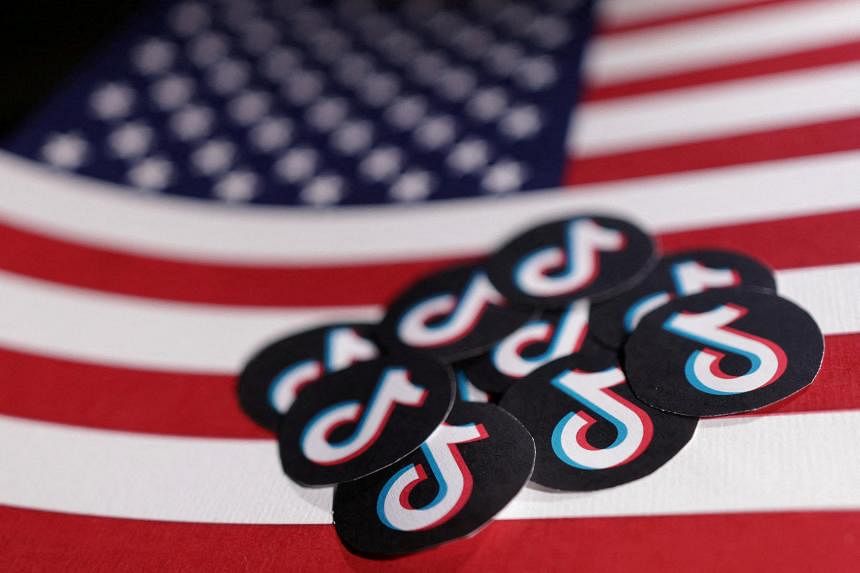
SINGAPORE - Popular short-video app TikTok might face being banned in the US after President Joe Biden on April 24 signed a Bill that will force its Chinese parent firm ByteDance to sell the social media platform.
The app would be banned in the United States if ByteDance fails to do so.
TikTok, which has 170 million users in the US at stake, has said it would challenge the ban in court.
ST spoke to communications and political science experts to find out how the ban will affect users both in Singapore and abroad, and whether other countries will also consider a similar ban on the social media app.
Q: How will the US ban on TikTok affect users in Singapore and globally?
A: In the short term, TikTok users in Singapore will not be significantly impacted, said Dr Tracy Loh, a senior lecturer at the Singapore Management University.
Should the ban take effect, TikTok will be removed from Apple’s and Google’s app stores in the US so new users would not be able to download it.
Existing TikTok users would still be able to use the app but would miss updates, security patches and bug fixes.
But this could mean US content creators might put out less content on TikTok or migrate to another platform, said Dr Loh, who specialises in social media campaign strategies.
This could push TikTok users here and abroad to move to those alternatives, such as Instagram Reels and YouTube Shorts.
Businesses dependent on the US market for sales might also be affected, Dr Loh said, adding that TikTok videos often direct viewers to the websites of such businesses.
Q: If I visit America on holiday, can I still use TikTok?
A: Even if visitors to the US cannot download TikTok from the Google and Apple app stores, there are workarounds to access TikTok, said Singapore University of Social Sciences’ (SUSS) associate professor Brian Lee.
One way is through virtual private network (VPN) apps, but this could violate TikTok’s terms of service, he added. A VPN service allows users to disguise the location of their devices.
Another way to access TikTok is to install a SIM card which is not registered in the US into a phone, said Prof Lee.
Q: Will other countries ban TikTok as well?
A: A “domino effect” might follow with other countries, especially those allied with the US, to potentially ban the social media application, said Prof Lee, who is head of SUSS’ communication programme
It could prompt other countries to study how TikTok would compromise data privacy and national security, and to what extent, he added.
He noted that several countries including India and Nepal had banned TikTok before the US Bill.
India banned 59 Chinese mobile apps, including TikTok, over national security and privacy concerns in 2020.
“Even though both ByteDance and the China government have denied such (security) claims, it is likely that those countries that have banned or temporarily banned TikTok or other Chinese apps previously will impose stricter rules on TikTok if the US bans TikTok eventually,” Prof Lee said.
That said, not all states will follow the US’ footsteps.
National University of Singapore associate professor of political science Chong Ja Ian said: “It is a matter for each individual state as they assess their own security risks, need to protect citizens’ privacy, and data protection considerations.”
Q: Why does the US want to ban TikTok?
A: The new law comes amid a four-year battle over TikTok between the US and China.
Widespread fear that TikTok might share the data of its US users with the Chinese government led the US Senate on April 23 to vote in favour of the TikTok Bill.
US Senator Marco Rubio, a top Republican on the Intelligence Committee, said: “For years, we’ve allowed the Chinese Communist Party to control one of the most popular apps in America. That was dangerously short-sighted.”
In response, the Chinese Foreign Ministry condemned the legislation, adding that “though the US has never found any evidence of TikTok posing a threat to the US’ national security, it has never stopped going after TikTok”.
Q: How did TikTok respond to the Bill?
A: ByteDance now has to sell TikTok within the next nine months.
The social media giant has said it would challenge the move in court.
If TikTok receives a preliminary injunction from the court, the forced sale process is paused. This would provide TikTok more time to operate freely in the US.
In a TikTok video on April 24, chief executive Chew Shou Zi said the social media app will continue to operate.
He said: “Rest assured – we aren’t going anywhere. We are confident and we will keep fighting for your rights in the courts.”
https://news.google.com/rss/articles/CBMibWh0dHBzOi8vd3d3LnN0cmFpdHN0aW1lcy5jb20vc2luZ2Fwb3JlL2Fza3N0LWhvdy13aWxsLWEtdXMtdGlrdG9rLWJhbi1hZmZlY3QtdXNlcnMtaW4tc2luZ2Fwb3JlLWFuZC1lbHNld2hlcmXSAQA?oc=5
2024-04-26 11:49:00Z
CBMibWh0dHBzOi8vd3d3LnN0cmFpdHN0aW1lcy5jb20vc2luZ2Fwb3JlL2Fza3N0LWhvdy13aWxsLWEtdXMtdGlrdG9rLWJhbi1hZmZlY3QtdXNlcnMtaW4tc2luZ2Fwb3JlLWFuZC1lbHNld2hlcmXSAQA
Tidak ada komentar:
Posting Komentar